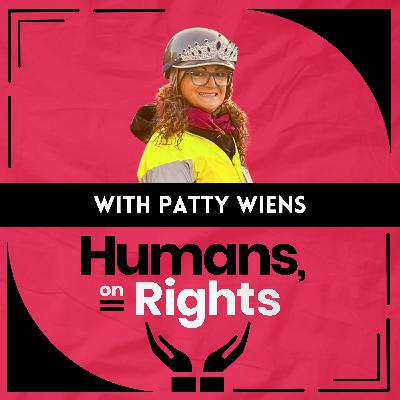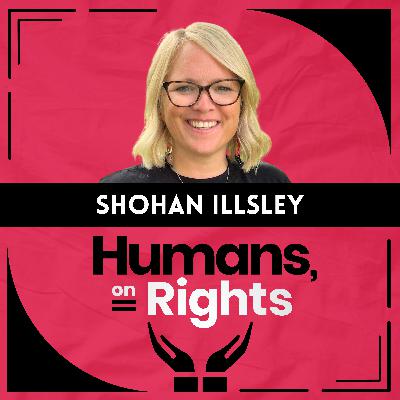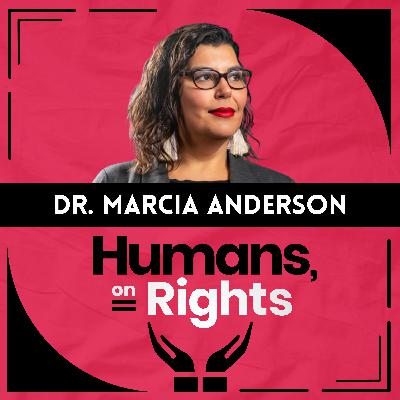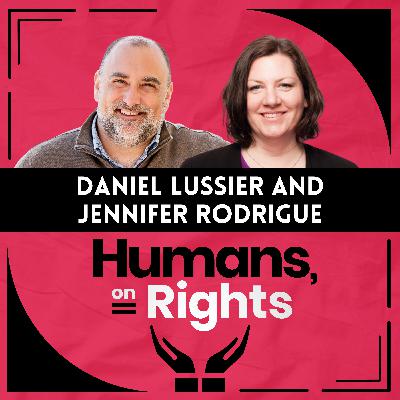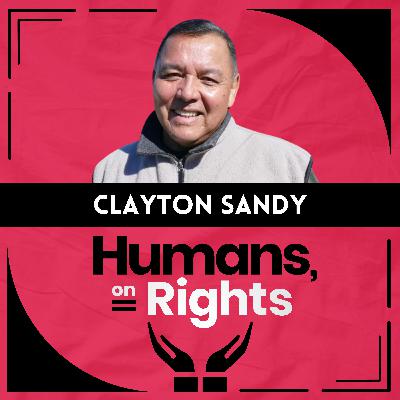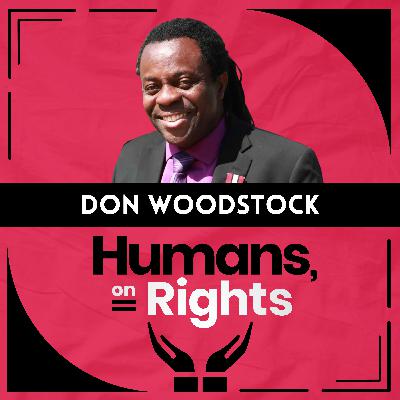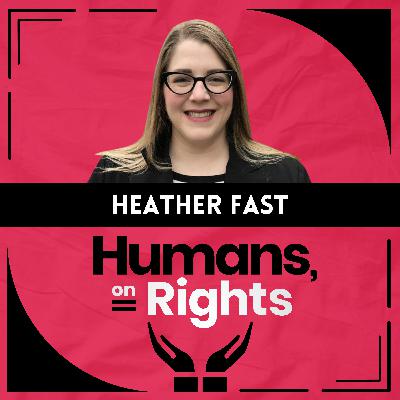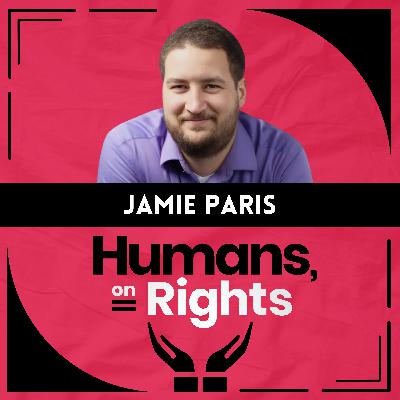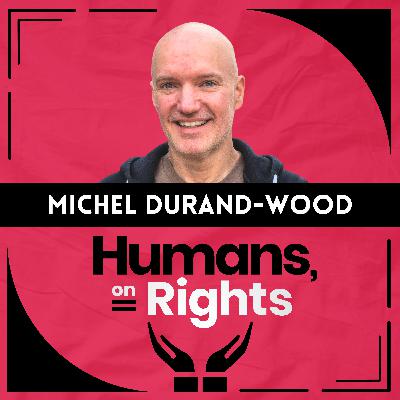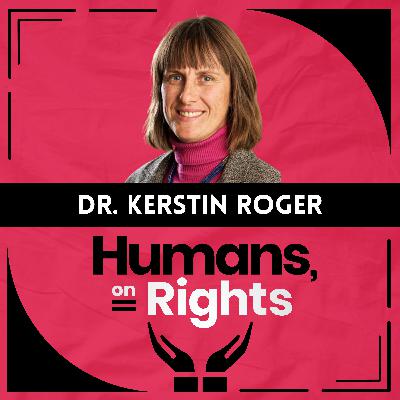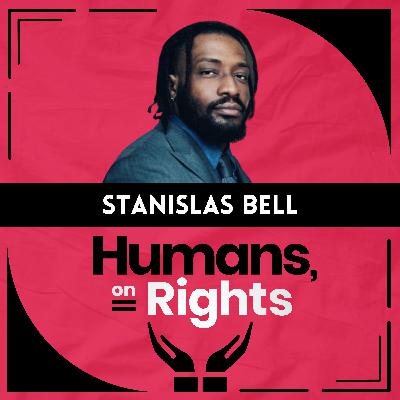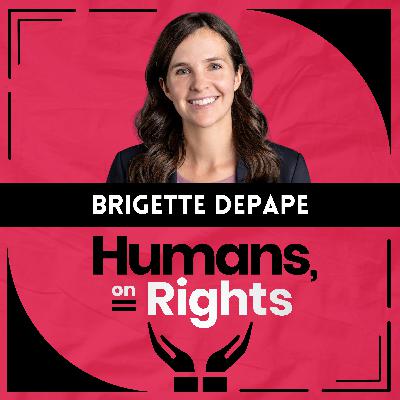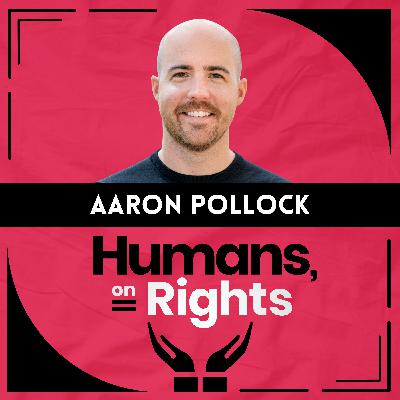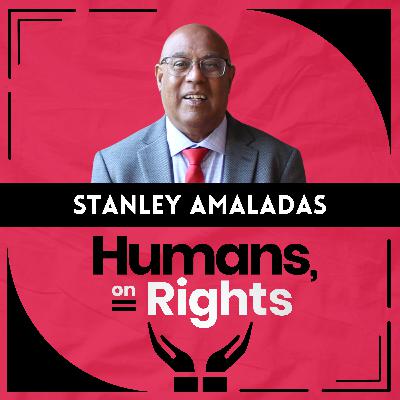Discover Humans, On Rights
Humans, On Rights

Humans, On Rights
Author: Stuart Murray
Subscribed: 21Played: 82Subscribe
Share
© COHRE 2021-2026
Description
Humans, On Rights is an intellectual and stimulating conversation with human rights grassroots influencers, community leaders, policymakers, advocates and educators about their passion to become human rights champions. Humans, On Rights host Stuart Murray, the Inaugural President & CEO of the Canadian Museum for Human Rights will explore with his guest the power of a positive outcome when you connect the three human rights dots - Education. Mobilization. Take Action.
126 Episodes
Reverse
For our second Black History Month episode, we're going beyond celebration and into accountability. Stuart Murray sits down with Janet James, Edmonton entrepreneur and leadership strategist, whose journey from growing up as one of the only Black families in Lancashire, England to becoming a corporate executive and business owner is both a personal story of resilience and a lens on who gets access to power, capital, and opportunity.Janet is the founder of Janet James Growth Leadership, and has been involved with the National Black Coalition of Canada, Black History Manitoba, and leadership events for Indigenous youth — work that reflects her belief that real progress is about closing gaps, not checking boxes.We're talking:Why representation alone isn't enough, and what economic equity actually looks like in practiceThe concept of "dark work" — the inner work nobody sees that makes everything else possibleHow the word "woke" got weaponized, and what it actually means to the people who've always used itWhat performative allyship looks like up close, and how to redirect it without coming from a place of angerJanet's path took her from suppressing her identity in an almost entirely white town in England, to finding community and courage in Edmonton, to rising through corporate ranks and eventually building her own business. Along the way, she ran DEI programs, spoke publicly about racism at a time when she feared it would cost her her job, and led leadership training for Indigenous youth in Winnipeg — drawing the through-line between different communities' shared experiences of being told what they can't do.As Janet puts it: "In order to grow yourself, you must know yourself first."Janet James' WebsiteSee Privacy Policy at https://art19.com/privacy and California Privacy Notice at https://art19.com/privacy#do-not-sell-my-info.
Black History Month isn't just 28 days in February—it's a year-round commitment to education, connection, and celebration. We sit down with Nadia Thompson, chair of Black History Manitoba, to discuss the 2026 theme "Rooted in Legacy: Honouring a Century of Black History" and the organization's 45th anniversary milestone.Nadia shares the evolution from the Black History Month Celebration Committee to Black History Manitoba, a shift that signals their year-round presence in the community. What started as two or three events in 1981 has grown to over 45 events in the first week alone—a testament to growing community engagement and awareness.We're talking:Why Black History Month is like a birthday celebration—recognizing that while the struggle exists every day, February offers a dedicated time to highlight pride and achievementThe Craig Block and Pilgrim Baptist Church as forgotten pieces of Winnipeg's Black history, including their role in supporting railway porters and creating safe spaces for Black travellersThe explosion of youth-led programming through Black Student Unions across Manitoba schoolsThe importance of volunteerism and how just one hour a week can make a meaningful impactMoving beyond February: Emancipation Day in August, Kwanzaa in December, and year-round educationNadia reminds us that diversity in Manitoba schools has skyrocketed since she was young, when she and her twin sister could count Black faces on one hand. Today's youth are more engaged, more connected, and more empowered to continue the legacy of those who fought for a seat at the table—or better yet, brought their own table.As Nadia puts it: "We struggle every day. But in February, the world has given us an opportunity to highlight the pride of being Black in this world."Find out more about Black History Manitoba and how you can get involved (in February and year-round): https://www.bhmwinnipeg.com/See Privacy Policy at https://art19.com/privacy and California Privacy Notice at https://art19.com/privacy#do-not-sell-my-info.
When we picture zero waste, we often think of recycling bins or reusable coffee cups. But Helga Jacobsen sees something bigger: behind every piece of waste is a human story — someone who made it, someone who handles it, and communities who live with its impact.As Sustainability Coordinator at The Forks, Helga Jakobson is turning one of Winnipeg's most beloved gathering places into a living example of how community spaces can practice real sustainability. From her background as a transdisciplinary new media artist to her current work transforming coffee grounds into de-icer, Helga brings creativity and data together to communicate what's happening with our planet in ways people can actually understand and act on.We're talking:- Why protecting the earth and protecting people are the same conversation- How The Forks operates in a circular economy instead of the "produce, consume, throw away" linear model- Why setting "zero" as a goal matters even if you don't quite reach itHelga reminds us that sustainability work doesn't require perfection or pushback. Sometimes the most innovative solutions come from conversations with tenants over coffee, listening to Indigenous voices and water protectors, and staying hopeful even when the news feels overwhelming.As she puts it: "Everyone has the ability to create impact around them. So speak up."Learn more about the Forks' "Target Zero" project.More on Helga:Helga Jakobson is the Sustainability Coordinator at the Forks and is a Transdisciplinary Artist. In 2017, she received an MFA from AKV St. Joost (The Netherlands) in conjunction with courses in the Transdisciplinary New Media program at the Paris College of Art (France). She has exhibited, lectured and participated in residencies across North and South America and Europe. She was selected for the Emerging Excellence Award by the Manitoba Arts Council in 2019, has mentored through Creative Manitoba, Video Pool and, currently, MAWA. She lectures on material ecologies, eco-feminism, and sustainability in art. Her art practice often focuses on how to live on a damaged earth and how to make tangible the almost invisible and inaudible losses that are occurring all around us, from an environmental perspective.As CEO of a bourgeoning recycling business (REDO Waste), a Butterflyway Ranger for the David Suzuki Foundation and former Executive Director of ArtsJunktion (a creative reuse depot), Helga brings to her role as Sustainability Coordinator wide spanning experiences that help her to promote sustainability, with waste diversion and composting at the Forks.When she’s off duty, she can be found hiking and camping, gardening and cuddling her foster fail dogs; Wednesday and Huginn. See Privacy Policy at https://art19.com/privacy and California Privacy Notice at https://art19.com/privacy#do-not-sell-my-info.
If your goals for 2026 include actually moving the needle on reconciliation, lawyer Bruce McIvor has news: you need to get uncomfortable.The Manitoba-born author of Indigenous Rights in One Minute joins us to cut through the performative gestures and explain what reconciliation actually demands. Bruce breaks down centuries of Indigenous law and constitutional rights in plain language—then challenges us to move beyond land acknowledgements to action that matters.We're talking:Why Indigenous rights aren't "special" privileges—they're legal obligations Canada made and must keepWhat Section 35 of the Constitution actually protects (and why most Canadians don't understand it)The difference between consultation theatre and genuine partnershipWhy feeling uncomfortable is exactly where real reconciliation work beginsWhat non-Indigenous Canadians can actually do to move reconciliation work forwardBruce reminds us: "If reconciliation is making you feel good, you're doing it wrong."Read Indigenous Rights in One Minute: What You Need to Know to Talk ReconciliationSee Privacy Policy at https://art19.com/privacy and California Privacy Notice at https://art19.com/privacy#do-not-sell-my-info.
We sit down with Patty Weins—author of That'll Never Work Here, host of the That's Her Problem podcast, and Bicycle Mayor of Winnipeg. Patty's journey from winter cycling newcomer to city-wide advocate reveals how transportation choices connect to mental health, physical wellbeing, climate justice, and the fundamental right to move safely through our cities.We're talking:Why 30% of the population can't drive—and what that means for designing equitable citiesHow winter cycling transformed from a parking cost workaround into a movement for safer streetsThe hidden connection between snow removal priorities and gender equality in urban designWhy "trip chaining" matters: how women navigate cities differently than traditional planning assumesWhat happened when one collision on Wellington Crescent galvanized 54 advocates in four weeksHow Brazil's bike culture shaped Patty's view of car dependency in Winnipeg—and what needs to changePatty challenges us to see transportation not as a convenience issue but as a fundamental right. When we design cities exclusively for cars, we're making choices about who belongs, who stays safe, and who gets left behind. Whether you're a daily driver reconsidering that right turn at Sherbrooke and Broadway or someone curious about the freedom winter cycling can bring, this conversation offers practical insights into building cities where everyone can arrive alive.Connect with Patty:Website: PattyBikes.comBook: That'll Never Work HerePodcast: That's Her Problem Learn more:Bike Winnipeg: bikewinnipeg.caBycs (Bicycle Mayors Network): bycs.orgSee Privacy Policy at https://art19.com/privacy and California Privacy Notice at https://art19.com/privacy#do-not-sell-my-info.
December 3rd was International Day of Persons with Disabilities—a day meant to recognize the contributions and rights of people with disabilities worldwide. Today, we're sitting down with someone who's spent 40 years making sure that recognition turns into actual change.Max Brault—national leader in accessibility, author, and someone who lives with spinal muscular atrophy—doesn't just talk about accessibility. He's helped build the Accessible Canada Act, transformed hiring practices in the federal government, and now consults with corporations trying to figure out what true inclusion actually looks like. His new book, The Race to the Starting Line, cuts through all the box-checking and virtue signalling to explain why equality has to start long before anyone even gets to compete.We're talking:Why the Accessible Canada Act exists—and why the Charter alone wasn't enoughThe moment Stats Canada discovered 27% of Canadians identify as having a disability (not the 4% everyone kept citing)How organizations confuse accommodation with inclusionWhy "we're working on it" is code for "we haven't actually started"The difference between designing for people with disabilities and designing with themWhether you're building spaces, creating policies, or just trying to understand why accessibility matters beyond compliance, Max brings decades of lived experience and hard-won wisdom about what it actually takes to build a world where everyone gets to show up fully.Learn more: Max Brault's website and bookSee Privacy Policy at https://art19.com/privacy and California Privacy Notice at https://art19.com/privacy#do-not-sell-my-info.
We sit down with Shohan Illsley, Executive Director of the Manitoba Harm Reduction Network, to explore how harm reduction is saving lives and restoring dignity to people who use substances across Manitoba. Shohan brings powerful insights into why compassion-based approaches are essential to addressing substance use in our communities.The Manitoba Harm Reduction Network operates 11 sites across the province, connecting people who use substances with the support they need to stay alive and thrive.We're talking:The toxic drug supply crisis that has claimed over 3,000 lives in Manitoba since 2014How the war on drugs is actually a war on people, rooted in racism and colonial harmThe role of manufactured poverty and homelessness in substance dependenceWhy evidence-based interventions like consumption sites reduce deaths and improve community safetyShohan reminds us that the majority of people use substances without problem—and those who do struggle deserve dignity, connection, and evidence-based support rather than criminalization and stigma."Can we just be brave and try something new?" she asks. "What we're asking people to try are interventions grounded in evidence that have been proven to have the desired outcomes we want."Learn more: Manitoba Harm Reduction NetworkSee Privacy Policy at https://art19.com/privacy and California Privacy Notice at https://art19.com/privacy#do-not-sell-my-info.
A recent Winnipeg Free Press article revealed an uncomfortable truth: Indigenous and Black patients in Manitoba wait longer in emergency rooms and are more likely to leave without receiving care. For Dr. Marcia Anderson, these aren't just statistics – they're a reality she's witnessed firsthand, both as a physician and through her father's near-fatal experience with racist healthcare.As a Cree Anishinaabe physician from Peguis First Nation and Norway House Cree Nation, Dr. Anderson has dedicated her career to dismantling the systemic racism that pervades Canada's healthcare system. Now serving as Vice Dean of Indigenous Health, Social Justice and Anti-Racism at the University of Manitoba, she's leading groundbreaking work to collect racial, ethnic, and Indigenous identifiers in healthcare – making Manitoba the first province in Canada to systematically track these critical disparities.We're discussing:How outdated and harmful theories like the "Thrifty Gene" theory were still being taught during her medical education, blaming Indigenous peoples' poor health on inferior genetics rather than addressing systemic factorsManitoba's pioneering work in collecting racial and ethnic data in healthcare, revealing disturbing patterns of longer wait times and worse outcomes for Indigenous and Black patientsThe critical difference between cultural safety training (which focuses on understanding different cultures) and anti-racism training (which addresses power, discrimination, and systemic barriers)Practical strategies for anyone who witnesses anti-Indigenous racism – from asking curious questions like "I don't understand why that joke is funny, can you explain it to me?" to marking inappropriate behaviour with simple statements like "I'm not comfortable with that remark"Dr. Anderson's message is clear: healthcare disparities aren't inevitable, and they're not the result of individual "bad apples." They're systemic issues that require systemic solutions – from better data collection to transforming medical education to holding institutions accountable for equitable care.As she powerfully notes, while her father had a physician in the family who could advocate for him during his medical crisis, the vast majority of Indigenous people facing healthcare racism do not have that privilege. That reality fuels her ongoing work to ensure every patient receives the care they deserve, regardless of race or background. See Privacy Policy at https://art19.com/privacy and California Privacy Notice at https://art19.com/privacy#do-not-sell-my-info.
We sit down with Andréanne Mulaire, co-founder of Anne Mulaire, a Winnipeg-based fashion company that has spent 20 years proving that ethical production, cultural heritage, and sustainability aren't just buzzwords – they're the foundation of a thriving business.Andréanne shares how she built a fashion brand that refuses to compromise, maintaining local production in Winnipeg, creating zero-waste collections, and offering sizes from double extra small to 6X – because sustainability should be for everyone.We're discussing:How watching manufacturers throw away 4-5 garbage bins of fabric daily sparked her commitment to zero-waste fashionWhy she chose to keep production in Winnipeg despite the financial challengesThe six sustainability programs she's created, from refreshing worn garments to turning production waste into new yarn for socksHow Métis heritage and family entrepreneurship spanning generations influences her design philosophyWhy she believes every piece of clothing has a story – and why we should care about those storiesAndréanne reminds us that sustainable fashion isn't about perfection – it's about making conscious choices: "We're all responsible for our own waste. Not doing something is worse. You just have to test, try, do something."Anne Mulaire's sustainability programs include:Refresh: Repairing and reinforcing garments to extend lifeResale: Creating entry points for new customers through pre-loved piecesRevive: Upcycling and transforming existing garmentsZero Waste Collection: Creating 100 one-of-a-kind pieces twice yearly from production remnantsDowncycle: Donating fabric remnants to community members for their projectsFiber Lab: Transforming production waste into new yarn for "Wasted Socks" and future fabricsConnect with Anne Mulaire at annemulaire.ca See Privacy Policy at https://art19.com/privacy and California Privacy Notice at https://art19.com/privacy#do-not-sell-my-info.
We sit down with Dan Lussier, CEO of Réseau Compassion Network, and Jennifer Rodrigue from Co-Habit to discuss their groundbreaking partnership creating accessible, affordable housing that centers dignity and community.We're talking:Why Manitoba's housing crisis demands innovative solutions that go beyond just "affordable units"How Co-Habit is reimagining supportive housing for people with profound physical disabilities who currently have limited options beyond personal care homesThe difference between accessibility standards and true accessible design—and why Canada's building codes still fall shortHow the Le Suite Marion project became a successful model combining deeply affordable housing with wraparound support servicesWhy segregation in housing (whether for seniors, people with disabilities, or any population) reinforces inequality and isolationThe power of integrated, intentional community in combating the loneliness crisis affecting all CanadiansDan and Jennifer remind us that housing is a human right, and true accessibility means more than meeting minimum standards—it means creating spaces where everyone can thrive with dignity, independence, and connection.Learn more:Réseau Compassion NetworkCo-HabitAction Marguerite St. BonifaceSee Privacy Policy at https://art19.com/privacy and California Privacy Notice at https://art19.com/privacy#do-not-sell-my-info.
We sit down with Clayton Sandy, a knowledge keeper and educator who brings decades of experience in government and Indigenous advocacy to our conversation about Orange Shirt Day and the ongoing journey toward reconciliation.Clayton shares his powerful personal story - from growing up as the son of a WWII veteran who lost his Indigenous status through enfranchisement, to his own experience in the 60s scoop, to building a career in government while facing systemic racism. His journey led him to become one of Manitoba's most respected voices on Indigenous issues and human rights.We're discussing:Why his father became a "non-Indian" after serving Canada in WWII and how this affected Clayton's entire familyThe reality of experiencing racism in government workplacesThe devastating impact of residential schools on his familyHow systems mapping and education became his tools for creating change across CanadaPractical ways all Canadians can move beyond awareness to meaningful action on reconciliationClayton reminds us that reconciliation isn't just about recognizing past wrongs - it's about stepping up, taking responsibility, and actively supporting Indigenous-led solutions. His message is clear: "Take off your blinders and open up your mind. Don't be afraid to come to a powwow or a gathering."Whether you're looking to understand the legacy of residential schools, wondering how to become a genuine ally, or seeking ways to honour Orange Shirt Day beyond September 30th, this conversation offers both the historical context and practical guidance needed to move forward together.Clayton's wisdom, built through decades of education work and lived experience, provides a roadmap for how we can all play a role in the seven generations of healing that reconciliation requires.See Privacy Policy at https://art19.com/privacy and California Privacy Notice at https://art19.com/privacy#do-not-sell-my-info.
We sit down with Don Woodstock, author of "Unrelenting" and the grassroots activist who transformed recycling in Winnipeg. Don's journey from a farm in Saint Elizabeth, Jamaica to becoming the driving force behind Manitoba's shift from 33% to 99% recycling participation is a masterclass in persistent community organizing and environmental justice.Don shares how his grandfather's simple question - "Is it bigger than you, son?" - became the foundation for taking on seemingly impossible challenges. When he arrived in Winnipeg and saw the potential for environmental change, he didn't wait for permission or funding. He made a documentary, knocked on doors, and refused to take no for an answer until people finally listened.We're talking:How growing up on a Jamaican farm taught sustainability lessons that urban Canada desperately neededWhy Winnipeg reminds him of Jamaica (minus the weather) and what that means for community organizingThe story behind getting major grocery chains to adopt reusable bags across CanadaWhat it takes to keep going when people literally spit on the ground and dismiss your ideasHow to plant seeds that will bear fruit long after you're gone - even if you never see the harvestThe human right to clean air, clean water, and a healthy environment for future generationsDon's approach to grassroots change offers a blueprint for anyone wondering how to make a difference: start local, don't expect instant gratification, and remember that real change happens like farming - you plant seeds, water them consistently, and trust the process even when you can't see immediate results.Whether you're passionate about environmental issues or simply wondering how one person can create systemic change, Don's story proves that unrelenting commitment to what you believe in can literally transform a city's relationship with the planet.Read "UNRELENTING: The Man Who Turned a Local Recycling Push, Into a National Plastic Ban"Don't miss the innovative audio version featuring Caribbean and African music inspired by the themes of environmental justice and community action!See Privacy Policy at https://art19.com/privacy and California Privacy Notice at https://art19.com/privacy#do-not-sell-my-info.
Heather Fast: Environmental Rights as Human RightsWhen the International Court of Justice issued a landmark advisory opinion on climate change this past July, it confirmed what environmental advocates have been arguing for years - that environmental protection is fundamentally about human rights. We sit down with Heather Fast, PhD candidate at the University of Manitoba's Natural Resource Institute and policy advocacy director of the Manitoba Eco Network, to break down what this means for Canada and communities like ours.Heather explains how the ICJ's non-binding but influential decision reinforces that the right to a clean, healthy and sustainable environment is essential for enjoying all other human rights. From wildfires forcing evacuations to climate refugees displaced by rising seas, environmental degradation disproportionately impacts marginalized communities who often have the least resources to adapt.We explore:How the ICJ's advisory opinion strengthens legal pathways for environmental protection, even though it's non-bindingWhy marginalized communities bear the heaviest burden when environmental rights are violatedThe recent LeMay Forest controversy in Winnipeg and how it illustrates tensions between private property rights and collective environmental interestsPractical ways Canadians can engage more meaningfully in environmental policy discussionsHow federal legislation like the Canadian Environmental Protection Act is beginning to recognize environmental rightsHeather brings both academic expertise and grassroots advocacy experience to help us understand why protecting our environment isn't separate from protecting human rights - it's the foundation that makes all other rights possible.Whether you're wondering how international law affects local policy or looking for ways to get more involved in environmental issues in your community, this conversation offers practical insights into one of the defining human rights challenges of our time.Connect with the Manitoba Eco NetworkSee Privacy Policy at https://art19.com/privacy and California Privacy Notice at https://art19.com/privacy#do-not-sell-my-info.
We sit down with Jamie Paris, a University of Manitoba literature scholar whose research bridges Shakespearean drama with contemporary issues of race, gender and masculinity. Jamie brings a unique perspective to conversations about what it means to be a better man in 2025.As an educator first and foremost, Jamie's work focuses on helping foster the next generation through meaningful classroom discussions about identity, dignity, and human connection. His personal journey - growing up as an orphan, becoming a young father at 17, and finding his path through academia - shapes his approach to understanding masculinity not as something to tear down, but as something to rebuild with joy, care, and moral courage.We're talking:Why many young men today feel ashamed of their gender and how to move beyond "toxic masculinity" conversationsDefining healthy masculinity: the desire to protect, care, and extend joy to othersHow Shakespeare's tragedies teach us about pride, community, and making better choicesWhy preventing gender-based violence starts with teaching consent and bodily autonomy from a young ageJamie challenges us to move past the question of "who's right and who's wrong" and instead focus on rebuilding trust - between individuals, communities, and across differences. His work reminds us that masculinity, when rooted in love and care for others, can be a source of strength and joy rather than harm.Whether you're a parent trying to raise thoughtful children, an educator working with young adults, or someone interested in how literature connects to contemporary social issues, this conversation offers practical insights into creating more meaningful connections in our communities.See Privacy Policy at https://art19.com/privacy and California Privacy Notice at https://art19.com/privacy#do-not-sell-my-info.
We sit down with Michel Durand-Wood, better known online as "Elmwood Guy," a Winnipeg-based writer, community advocate, and author of "You'll Pay for This: How We Can Afford a Great City for Everyone Forever." Michel shares his journey from concerned neighbour to influential voice in municipal finance and urban planning.We're discussing:How noticing decline in his Elmwood neighbourhood sparked Michel's passion for municipal advocacyWhy the 2018 Portage and Main plebiscite became a turning point in his understanding of public engagementThe hidden connections between municipal finance and human rights - from equitable public services to housing accessibilityHow infrastructure decisions made today impact our city's ability to provide services "forever"Michel reminds us that municipal finance isn't just about budgets - it's about creating inclusive communities where everyone can thrive. His approach demonstrates how understanding the financial implications of city planning decisions empowers citizens to advocate for more equitable and sustainable urban development.Connect with Michel:His blog: https://www.dearwinnipeg.com/Read "You'll Pay for This: How We Can Afford a Great City for Everyone Forever"See Privacy Policy at https://art19.com/privacy and California Privacy Notice at https://art19.com/privacy#do-not-sell-my-info.
We sit down with Dr. Kerstin Roger, a researcher and advocate tackling an urgent but often overlooked human rights issue: the abuse of older adults. Dr. Roger shares why this isn't just a family matter—it's a fundamental question of human dignity and rights.We're talking:Why age has been historically left out of human rights frameworksHow different communities define aging differently, and the global variations in lifespan and health outcomesWhy traditional data collection methods fall short in capturing the real scope of the problemFinancial abuse as the newest and fastest-growing form of harmHow we can shift from fear-based narratives to celebrating the wisdom and contributions of older adultsDr. Roger reminds us that older adults are citizens who deserve to be equal and active participants in our communities, with the right to make their own decisions about their lives and wellbeing.As she states: "It is a luxury to age, and we have really come to see it as a possible burden to us and others... we really need to reinforce this idea that actually getting older is a luxury and a privilege."Watch the "Who Should I Tell?" awareness video in multiple languages on the A&O Youtube channelSee Privacy Policy at https://art19.com/privacy and California Privacy Notice at https://art19.com/privacy#do-not-sell-my-info.
We sit down with Stanislas Bell, Manager of Visitor Services at the Canadian Museum for Human Rights and the first Black manager in a position of power at the institution. Originally from Cameroon, Stanislas shares his journey from teenage immigrant to community leader, including a life-threatening encounter with medical racism that shaped his commitment to serving others.We're talking:Moving from Cameroon to rural Manitoba at 16, speaking only FrenchHow sports became his bridge to acceptance in a new cultureA harrowing hospital experience where discrimination nearly cost him his lifeWhy representation matters for building trust in human rights institutionsLeading the museum through COVID-19 challenges and vaccine mandatesFounding his own initiatives to empower Winnipeg's black communityStanislas reminds us that leadership means "transforming anything that's negative into something positive" and building the next generation of leaders. His story shows how personal trauma can become a catalyst for community change when we choose service over silence.See Privacy Policy at https://art19.com/privacy and California Privacy Notice at https://art19.com/privacy#do-not-sell-my-info.
We sit down with Brigette DePape, project manager and climate planner at Narratives Inc, who brings together climate advocacy, education, and community action in powerful ways. As someone who's been part of the climate justice movement for over 15 years, Bridgette offers both personal insights and practical solutions for addressing our climate crisis while building resilient communities.How early experiences connecting with nature—from bike rides through Seine River Forest to cleaning up garbage from the Seine River—shaped Bridgette's environmental passionWhy climate change isn't just an environmental issue, but a human rights issue that disproportionately affects marginalized communitiesThe critical importance of Indigenous-led climate solutions, from wind energy projects to protected and conserved areas like the Seal River WatershedReal-world strategies for families to reduce their carbon footprint, including insights from Bridgette's participation in the Live Net Zero challenge with Canadian GeographicHow wildfires have created a devastating feedback loop—becoming Canada's largest source of greenhouse gas emissions while our boreal forests shift from carbon sinks to carbon sourcesThe intersection of climate justice and queer rights, and why inclusive spaces matter for building resilient communitiesPractical approaches to climate anxiety: acknowledging the fear while focusing on what we can control and influenceBridgette reminds us that while the climate crisis feels overwhelming, meaningful action starts with community—whether that's supporting evacuated families, advocating for wildfire prevention strategies, or creating the green jobs our economy needs for a just transition.As she powerfully states: "If we take care of the earth, the earth will take care of us, and if we destroy the Earth, the Earth will destroy us."Connect with Brigette: Narratives IncPoetry book: "Sun Compass" Get Involved: Learn about Indigenous Clean EnergyExplore the Live Net Zero ChallengeSupport Biz for Climate ManitobaFind queer-affirming spaces through the LGBTQ Chamber of CommerceSee Privacy Policy at https://art19.com/privacy and California Privacy Notice at https://art19.com/privacy#do-not-sell-my-info.
Aaron Pollock: Architecture as Human Rights - Designing Spaces for Justice and InclusionIt's Pride month, and we're sitting down with Aaron Pollock, associate architect at Number TEN Architectural Group and the lead architect behind the Rainbow Resource Centre's groundbreaking phase two expansion. Aaron brings together his passion for inclusive design with real-world expertise in creating what he calls "purpose-built queer spaces" - moving beyond simply adapting existing buildings to designing from the ground up with community needs at the centre. In this episode, Aaron shares:How the concept of "queering space" differs from designing purpose-built queer spaces from the beginningWhy flexibility, adaptability, and the absence of hierarchy are crucial elements in creating truly welcoming spacesThe innovative approach of "trauma-informed design" and how the "three Cs" - choice, comfort, and connection - guide architectural decisionsHow the Rainbow Resource Centre's new building is creating both loud-and-proud moments and quiet, tucked-away spaces for those at different stages of their journeyAaron reminds us that architecture isn't just about shelter or aesthetics - it's about dignity, access, and creating spaces where everyone can feel they belong.See Privacy Policy at https://art19.com/privacy and California Privacy Notice at https://art19.com/privacy#do-not-sell-my-info.
We sit down with Dr. Stanley Amaladas, Director of the Mauro Institute for Peace and Justice at the University of Manitoba. Dr. Amaladas reflects on his journey from Malaysia to Canada and shares a powerful story about his citizenship interview that shaped his understanding of human rights, responsibility, and dignity.We're exploring:How an uncomfortable citizenship interview became a lesson about rights, power, and responsibilityThe difference between the legal framework of rights and our human responsibility to othersWhy "who's right and who's wrong?" is often the wrong question in conflict resolutionDr. Amaladas' vision for continuing Arthur Mauro's dream of making Winnipeg a "cultural centre for hope"The importance of approaching difficult conversations with curiosity instead of judgmentHow we can speak to those in positions of power "in a way that is not tyrannical"Dr. Amaladas brings both academic expertise in Leadership Studies and personal experience to this thoughtful discussion about what it means to lead for peace. His perspective on treating people as people first - recognizing their dignity beyond their utility - offers an important lesson for navigating today's divided world.As Dr. Amaladas reminds us: "It's not going to come from theories or big ideas. It's going to come from people who treat people as people."Learn more about the Arthur V. Mauro Institute for Peace & JusticeSee Privacy Policy at https://art19.com/privacy and California Privacy Notice at https://art19.com/privacy#do-not-sell-my-info.






